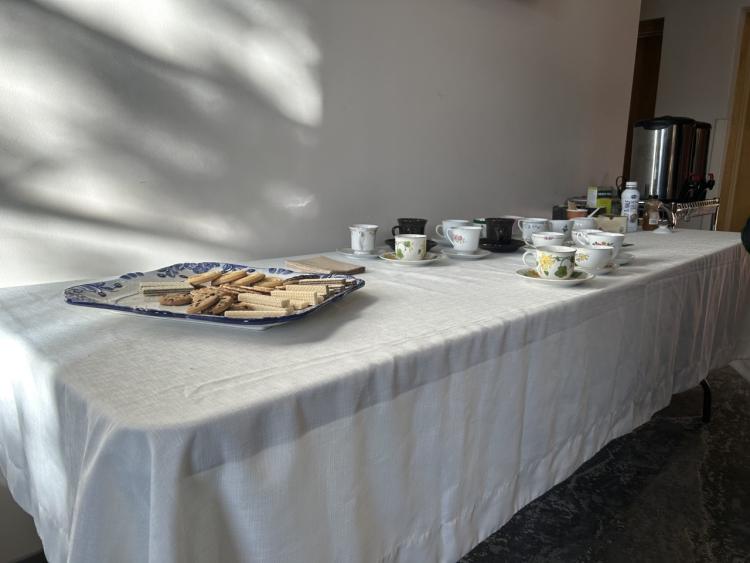Inclusive excellence at the College of Music

Higher ed and the arts are beacons of progress in times of social change, and the College of Music is poised to contribute to that story. Our faculty, staff, students and alumni are committed to expanding and deepening our collective approach to active allyship and anti-racism; and to a culture of belonging and inclusivity for all, with an emphasis on racial equity and justice.

What are some examples of current DEI—diversity, equity and inclusion—activities at the college?
McClain: For starters, we offer regular activities to connect, hold space and build community through our Diverse Musicians’ Alliance (DiMA). We’ve also instituted “tea + equity” chats—weekly DEI discussions in Grusin Lobby for students, faculty, staff and other campus constituents. Additionally, the college presents its long-running Persevering Legacy concerts to our college, campus and greater community every semester.
Coming up, we’re looking forward to our World Music ensembles’ spring performances and—this week—we’re excited to present our Annual Distinguished Lectureship.

McClain: DiMA is part of the CU Leadership, Excellence, Achievement, Diversity (LEAD) Alliance focused on inclusivity and student success. It offers a space for students to come together. We enjoy a variety of activities together including guest speakers—many of whom are alumni who share their insights on expertise on a range of topics related to inclusivity, finding your voice and achieving success.
Tell us more about the Persevering Legacy concerts.
Thomas: Our Persevering Legacy events—representing a partnership between the College of Music and our American Music Research Center (AMRC)—champion collaboration that elevates the stories of women composers, and that aligns music study and performance with social activism. Our most recent Persevering Legacy concert included a master class with Gregory Walker, son of Helen Walker-Hill who wrote the first book on Black women composers; the AMRC has research papers from that book project, including many unpublished or hard-to-access manuscripts or compositions.
When we started Persevering Legacy in 2019, the goal was to inspire performances of the Helen Walker-Hill Collection. Now, we encourage students to select compositions by women from underrepresented groups—which can include the Helen Walker-Hill Collection, but students aren’t limited to that. Persevering Legacy concerts are a different vibe because they’re entirely student driven, they select the pieces that they want to perform; and you get to experience a variety of genres, styles, instrumentations, ensembles and voices in nontraditional formats. It’s really entertaining and interesting as an audience member because you get to hear so much in such a short amount of time.
Tell us more about the upcoming Distinguished Lectureship.
McClain: We’re so excited about this year’s Annual Distinguished Lectureship featuring André de Quadros (pictured above)—conductor, ethnomusicologist, music educator, writer and human rights activist. Based on decades working in some of the most desperate and marginalized settings, de Quadros will anchor his March 16 keynote in the great tradition of freedom dreaming. He calls for a new architecture of music performance and scholarly work, founded on radical compassion, dialogue and community engagement. Our distinguished lectures are quite a big deal for our college—and for our campus.
Thomas: As a changemaker, de Quadros is a really important voice to bring into the conversation here: His experiences and expertise are embedded across prominent music institutions which gives him a bird’s eye view on the structural issues of DEI in institutions of music learning—and we’re really excited to get exposure to that perspective.
What are your goals for DEI in the College of Music going forward?
Thomas: My number one goal is to build an infrastructure that outlasts individuals. So often in DEI work, the work has happened through the passion, commitment and often volunteerism of really dedicated people who have a lot of knowledge—but when they leave, that knowledge and those experiences leave with them. The college is in a strong position now to build an infrastructure that will outlast Alexis and me. In a word, my goal is sustainability.
McClain: A lot of what I do is student-facing, so my goal is to ensure that students who are from marginalized identities feel welcome, comfortable and supported at the College of Music—beyond mere words on a piece of paper, but in everything we do at the college. For faculty and staff, too, it’s important that we be authentic and steady in our work toward expanding and strengthening inclusivity.
Thomas: The College of Music has committed to putting people in place to help the institution deliver on its DEI goals … and our students are completely energized to do the work, too. So I feel like we’re primed to make progress at a time when the campus shares the same level of energy, momentum, intention and accountability.
Note: As we continue to grow our efforts around DEI at the College of Music, five task forces have prepared recommendations—re: curriculum, co-curricular programming, concert repertoire/programming, faculty hiring and student recruitment—for improving and expanding our commitment to inclusive excellence within our college. This work resulted from the combined efforts of faculty, staff, students and community members. Currently, the College of Music’s Diversity, Equity, Inclusion + Accountability (DEIA) Committee is working to facilitate and implement the recommendations made by the task forces.


